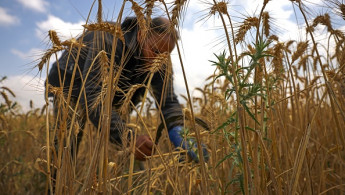Gaza's wheat farmers hit hard this harvest season due to climate change
The Palestinian wheat farmers in the besieged coastal enclave of the Gaza Strip have said that they have lost out on the harvest season this year as a result of the consequences of climate change.
Speaking to The New Arab, Mohammed Oda, director at the Ministry of Agriculture ruled by Hamas, said, "Unfortunately, climate change has negatively impacted the crops of wheat, with production decreasing once again."
"Last year, the besieged Gaza produced about 5,000 tons of wheat, while we expect that the territory will produce about 4,000 tons of the wheat crop this year," Oda added.
As a result, according to Oda, hundreds of farmers will incur heavy losses, while thousands of workers in the agricultural fields will not be able to make enough money to keep their families afloat.
Local wheat crop usually accounts for 2 per cent of consumption in the Gaza Strip, whose 2.3 million people consider traditional flatbread an indispensable part of their diet.
"Climate change has tangibly affected my wheat because the winter season arrived late this year, causing heavy damages to my crops," Ahmed al-Amour, a Gaza-based farmer, said to TNA.
Additionally, the farmer noted, "The winter season was so cold and it spent long months without allowing my crops to struggle and survive from the unprecedented weather instability."
The 63-year-old farmer planted about 40 dunums of his land, which were supposed to produce about 40 tons of wheat, but he harvested only about nine tons of wheat crop.
"Such an amount of production can barely allow me to pay salaries for twenty workers. However, I gain nothing of money this year," the farmer said.
He further pointed out that he incurred about US$ 40,000 this year, adding, "Neither the agriculture ministry nor any other nongovernment institutions will pay compensation to farmers in Gaza."
Unlike previous years, Salah al-Farra, a farmer from Khan Younis city in the south of Gaza, could not join the current wheat harvest season as his employer did not plant his land with wheat crops.
"Because of the climate change, I could not earn any money from the agricultural field as most of the various crops were damaged," the 39-year-old father of six said.
To keep his family afloat, the young man farmer decided to find another job in construction. "Now, I can make US$15 a day, just to feed my kids."





 Follow the Middle East's top stories in English at The New Arab on Google News
Follow the Middle East's top stories in English at The New Arab on Google News


